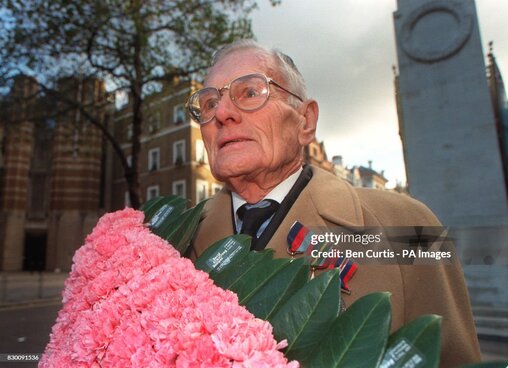|
Dudley Cave: Born London 19 February 1921; died London 19 May 1999 Dudley Cave was born in London in 1921, and worked for Odeon Cinemas when he was young. He was conscripted into the Army in 1941 and served in the Royal Army Ordnance Corps as a driver. Until 1999, there was an official ban on lesbians and gay men serving in the Armed Forces. Despite this, and despite the homophobia back in the UK, according to Cave, homosexual officers were more or less accepted. Even when ‘caught in the act’, they may get a reprimand, be transferred to a new unit, or be given hard labour to turn them into ‘real men’ "People were put in the army regardless of whether they were gay or not", said Cave. "It didn't seem to bother the military authorities. There was none of the later homophobic uproar about gays undermining military discipline and effectiveness. With Britain seriously threatened by the Nazis, the forces weren't fussy about who they accepted... They used us when it suited them, and then victimised us when the country was no longer in danger. I am glad I served but I am angry that military homophobia was allowed to wreck so many lives for over 50 years after we gave our all for a freedom that gay people were denied." Taken from a piece by Peter Tatchell Cave was taken prisoner by the Japanese in 1942, and was assigned to the construction of the Thai-Burma railway, not far from the renowned bridge over the River Kwai. He was then sent to Changi Prison in Singapore after a serious bout of malaria, where he stayed until the end of the war. He lost four stone – one third of his body weight – and was close to death from malnutrition. In Changi, an army medical officer gave him a copy of Sexual Inversion by Havelock Ellis, and this helped him to accept his sexuality. Cave was repatriated after the end of the war, in 1945.
Back in the UK, there was still a lot of discrimination against gay people. In 1954, Cave was asked to resign from his job as manager of Majestic Cinema in Wembley, London. When he refused, he was given the sack. Also in 1954, Cave met his partner, Bernard Williams. Williams had married his wife, June, to try to ‘overcome’ his sexuality. June understood, and the three became close friends, living together in Golders Green. Cave and Williams stayed together as lovers and gay rights campaigners until Williams’ death in 1994. In 1971, Cave joined the Unitarian Church, and was key to them ordaining lesbians and gay men, blessing same sex relationships and advocating for LGBTQ+ human rights, even before legal recognition of same sex relationships. He created Intergroup, which brough together LGBTQ+ and straight Unitarians to promote acceptance and foster dialogue, one of the first groups of its type. He campaigned for peace and reconciliation between Japanese soldiers and prisoners of war, and he attended the dedication of a Buddhist temple on the banks of the River Kwai as a symbol of this reconciliation. Cave was one of the original committee members of the London Gay Switchboard (now Switchboard LGBT+) at its launch in 1974, and he remained answering phones until his death. Through the calls he took, he saw LGBTQ+ people who had lost their partners grieving without support and being excluded from funerals, losing inheritances and facing eviction from joint homes. To meet their support needs, he created the Lesbian and Gay Bereavement Project. The project was the first of its kind to be established in the UK, and the first organisation with ‘gay’ in the title to gain charitable status in the UK (despite pushback from the Charity Commissioners to change the name). Another of his campaigns was to get the Royal British Legion, the UK Government and the Armed Forces to acknowledge that LGBTQ+ people served in the Armed Forces and lost their lives. Not long before his death he spoke at OutRage!'s Queer Remembrance Day vigil at the Cenotaph, and laid a pink triangle (the symbol worn by LGBTQ+ prisoners in concentration camps) to honour the lives and deaths of LGBTQ+ people. Sources: The Yorkshire Unitarian Union BBC: A gay soldier’s story Obituary: Dudley Cave (Peter Tatchell) Peter Tatchell on Dudley Cave (video)
0 Comments
Leave a Reply. |
AuthorI was widowed at 50 when Tim, who I expected would be my happy-ever-after following a marriage break-up, died suddenly from heart failure linked to his type 2 diabetes. Though we'd known each other since our early 20s, we'd been married less than ten years. Archives
July 2024
Categories
All
|



 RSS Feed
RSS Feed